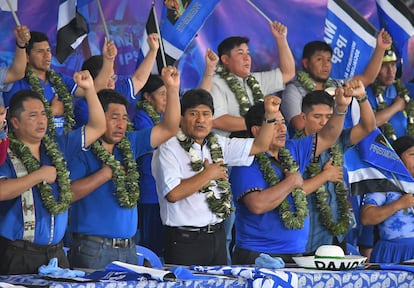Evo Morales’ party expels President Luis Arce and deepens political war in Bolivia
The former head of government shows his strength in a party congress with his faithful in the midst of his fight with Arce for the leadership of the left

The 10th congress of the Movement towards Socialism (MAS), the party that governs Bolivia, has taken the definitive step towards a division that has been brewing for years. The gathering “accepted the self-expulsion” of Luis Arce and David Coquehuanca, president and vice president of the country, for not attending the meeting that took place in the town of Lauca Ñ, in the coca-growing area of the center of the country, and has ordered the expulsion of another 20 deputies with ties to the Arce administration. Furthermore, as expected, the party congress ratified “Commander” Evo Morales as president of the party and as its presidential candidate for the 2025 elections.
“We continue making national and international history. The MAS is going to recover the revolution to save the country again,” Morales said in his final speech, which was unusually brief. The hundreds of attendees at the meeting were tired due to the high temperatures of the location, in the tropical area of Cochabamba, and, also because of the long sessions extending until the early hours of the morning.
Meanwhile “Arcismo” has challenged the legitimacy of the congress before the Constitutional Court, which ordered its suspension a few hours before its end. Morales had previously warned that the government was “maneuvering” within the justice system to prevent the congress from taking place. The former president (2006-2019) also expressed concern on his social media accounts about a police operation supposedly underway, which did not occur. “Unfortunately, the Government of Lucho and David, worse than the neoliberal governments, until the last moment wanted to postpone the congress,” Morales said at the end of his speech.
The clash for control of the Bolivian left threatens to aggravate the politicization and weakness of the justice system and other institutions. The ruling by the Constitutional Court could turn congressional resolutions into meaningless documents from a legal point of view. A group of Morales’ lawyers told the press that the ruling by the Constitutional Court was “fraudulent” and assured that it would have no legal effect.
If the Constitutional Court prevails, which seems more likely, the pressure will turn towards the Electoral Court, in whose hands it will be to issue a deadline for MAS to organize another congress and elect its leadership in a less controversial way, an almost impossible task. Another option would be to cancel this acronym altogether, which would have incalculable political consequences.
For months it had been anticipated that the fight for “ownership” of the party would be very tough and that it would be settled mainly through trials. Thus, courts with little credibility will make resolutions that will be challenged by other courts that are also discredited, with no clear end in sight.
Although the fight between the two wings of the MAS is increasingly complex and tough, the bottom line of the issue is simple: which one, Morales or Arce, will be the candidate of the Bolivian popular and indigenous sectors in the 2025 presidential elections. This personal aspect intensified following the MAS congress, in which hundreds of people dressed in the blue color of MAS and wearing t-shirts and caps with Morales’ face on them, proclaimed him as their “undisputed leader.” Simultaneously, the farmers with whom Arce met on Tuesday in La Paz called him “a scholar,” “a student,” and even “the greatest economic scientist in South America,” in order to differentiate him from Morales, who only got as far as high school before starting to work on his father’s land.
In the latest clash between both politicians, Morales called Arce a mere “cashier” for his service as Minister of Economy. “Call me whatever you want, the results are what count,” the president replied. He then pointed out that he was a learned man who was not going to plot against his former mentor. Emphasizing the president’s academic qualifications is not perceived as a classist insult in the emerging urban social sectors, which identify with Arce because they appeal to education as a means of social advancement. Morales, who in the past had undeniable support, retains the strong support of the poorest strata of rural areas.
Sign up for our weekly newsletter to get more English-language news coverage from EL PAÍS USA Edition
Tu suscripción se está usando en otro dispositivo
¿Quieres añadir otro usuario a tu suscripción?
Si continúas leyendo en este dispositivo, no se podrá leer en el otro.
FlechaTu suscripción se está usando en otro dispositivo y solo puedes acceder a EL PAÍS desde un dispositivo a la vez.
Si quieres compartir tu cuenta, cambia tu suscripción a la modalidad Premium, así podrás añadir otro usuario. Cada uno accederá con su propia cuenta de email, lo que os permitirá personalizar vuestra experiencia en EL PAÍS.
¿Tienes una suscripción de empresa? Accede aquí para contratar más cuentas.
En el caso de no saber quién está usando tu cuenta, te recomendamos cambiar tu contraseña aquí.
Si decides continuar compartiendo tu cuenta, este mensaje se mostrará en tu dispositivo y en el de la otra persona que está usando tu cuenta de forma indefinida, afectando a tu experiencia de lectura. Puedes consultar aquí los términos y condiciones de la suscripción digital.








































